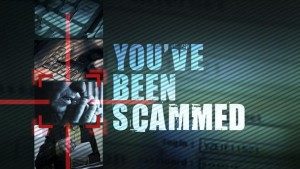Have you been scammed?
 Unfortunately, many people are scammed every year in Australia. While it is very difficult to track down the person or group who has scammed you, there are some steps you can take straight away to reduce the damage. You may also be a target for a ‘follow-up’ scam, so you need to take action to stop the scammers succeeding again.
Unfortunately, many people are scammed every year in Australia. While it is very difficult to track down the person or group who has scammed you, there are some steps you can take straight away to reduce the damage. You may also be a target for a ‘follow-up’ scam, so you need to take action to stop the scammers succeeding again.You should also take the time to report a scam. By making a report to the appropriate government agency, you help them identify scammers and warn other people about the scam. You should also warn your friends and family so they do not become a victim as well. By sharing your story, you are helping to fight back against the scammers. SCAMwatch also features a number of victim stories from everyday people who wish to share their experience as a warning to others.
- If you think someone has gained access to your online account, telephone banking account or credit card details
- If you have sent money to someone that you think may be a scammer
- If you have been scammed using your computer
- If you have been tricked by a door-to-door seller or trader
- If the scam involves your mobile phone
- If the scam relates to your health
- Reporting a scam & what the law says
If you think someone has gained access to your online account, telephone banking account or credit card details
Call your bank or credit union immediately, so they can suspend your account. The appropriate telephone number should be on the back of your ATM or credit card, or on an account statement. Alternatively, you can look up the correct number in the phone book. DO NOT contact the company using details that appear in emails or on websites that you are suspicious of—they will probably be fake and lead to a scammer.
Alerting your bank or credit union immediately can limit the amount of money you are liable for. Credit card companies may also be able to perform a 'charge back' (reverse the transaction) if they believe that your credit card was billed fraudulently.
If you have sent money to someone that you think may be a scammer
If you sent your credit card details: follow the instructions in the section above.
If you sent money through an electronic funds transfer (over the internet): contact your bank or credit union immediately and ask them to cancel the transfer. They may be able to stop the transfer if it has not already been processed.
If you sent a cheque: ask your bank or credit union to 'stop' the cheque. You must do this before the cheque is drawn on (cashed in by a scammer).
If you sent money through a wire service (such as Western Union): contact the wire service immediately and ask them to stop the transfer (you will need to be very quick).
If you have been scammed using your computer
Chances are the virus or other malicious software is still on your computer. You should run a full system check using a reliable virus checker. If you do not already have this software and other protections like a firewall installed on your computer, you should do so (a software professional can help you decide what is best).
The scammers may have gained access to your online passwords so, after you have cleaned up your computer, you should change these as well.
If you have been tricked by a door-to-door seller or trader
If a trader come to your door and are unsure of whether they are legitimate or a scammer the following may help. A genuine trader by law must:
- explain upfront the purpose of the visit and produce identification
- inform you that you can ask them to leave
- leave the premises if you ask them to do so
- explain your cooling-off rights to terminate the agreement within 10 business days, and
- provide their contact details in the agreement.
There are also certain hours when traders can not visit your home. For more information see our Door-to-door scams page.
If the scam involves your mobile phone
Call your telephone company and let them know what has happened. You may also wish to contact the Telecommunications Industry Ombudsman (TIO) for information and advice.
If the scam relates to your health
Stop taking any pills or substances that you are not sure about. See a doctor or other qualified medical professional as soon as you can. Be sure to tell them about the treatment that the scammer sold (take along any substances, including their packaging). Also tell your health professional if you have stopped any treatment that you were on before the scam.



0 blogger-facebook:
Post a Comment